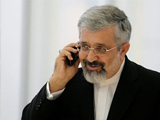|
|
TODAY.AZ / Politics
Israel, Iran hold closed-door talks first time for last 30 years - UPDATE
22 October 2009 [16:23] - TODAY.AZ
A representative of the Israel Atomic Energy Commission and a senior Iranian official met last month to discuss the chances of declaring the Middle East a nuclear-free zone, Israel-based Haaretz newspaper reported.
 17:24
17:24A representative of the Israel Atomic Energy Commission and a senior Iranian official met last month to discuss the chances of declaring the Middle East a nuclear-free zone, Haaretz has learned. This is the first direct meeting between official representatives of the two states since the fall of the Shah in 1979.
The Iranian Atomic Organization on Thursday denied that officials from Israel and Iran recently took part in the Cairo conference, calling the report "sheer lies."
14:28
This is the first direct meeting between official representatives of the two states since the fall of the Shah in 1979.
Meirav Zafary-Odiz, director of policy and arms control for the Israel Atomic Energy Commission, and Ali Asghar Soltanieh, Iran's ambassador to the International Atomic Energy Agency (IAEA), met several times over September 29 and 30 and, together with representatives of other countries, conversed, presented questions and gave replies.
The meeting was held at the Four Seasons Hotel in Cairo under the auspices of the International Commission on Nuclear Non-Proliferation and Disarmament. Also attending were representatives of the Arab League, Jordan, Egypt, Tunisia, Turkey, Morocco, the United Arab Emirates and Saudi Arabia, along with European and American officials.
The meetings were held behind closed doors, and all participants committed to complete secrecy, to allow a full and frank discussion. However, the fact of the meeting was leaked by Australian sources to the Australian daily The Age.
The Israel Atomic Energy Commission confirmed that such a meeting did take place but refused to comment.
The exchanges between the Iranian and Israeli representatives took place within three panel sessions, each dealing with one of the issues with which the ICNND is concerned - declaring the Middle East a nuclear-free zone, preventing nuclear proliferation in the region and matters of nuclear energy for peaceful purposes. The two did not meet or shake hands outside the sessions. In one of the discussions, Soltanieh directly asked Zafary-Odiz - and eyewitnesses say he spoke in an impassioned voice, "Do you or do you not have nuclear weapons?" Zafary-Odiz smiled, but did not respond.
URL: http://www.today.az/news/politics/56804.html
 Print version
Print version
Views: 1323
Connect with us. Get latest news and updates.
See Also
- 21 September 2025 [11:02]
President Ilham Aliyev congratulates President of Malta - 19 September 2025 [13:36]
Azerbaijan joins both main decision-making bodies of Universal Postal Union for first time - 19 September 2025 [13:20]
Baku, Tehran push for joint industrial town, logistics hub - 19 September 2025 [11:11]
Dream of Reason - who wants to set Middle East at odds with Azerbaijan - 18 September 2025 [14:44]
Azerbaijan’s Prime Minister participates in Turkic States meeting in Bishkek - 18 September 2025 [14:14]
Dutch Ministry of Foreign Affairs is correcting itself – but toponyms are not everything - 18 September 2025 [13:50]
European Union vows to keep backing efforts for enduring regional peace - 18 September 2025 [13:42]
Azerbaijan would continue its efforts to advance peace agenda in region - President Ilham Aliyev - 18 September 2025 [12:44]
President Ilham Aliyev receives Commissioner Marta Kos - 18 September 2025 [12:31]
Azerbaijani PM arrives in Kyrgyzstan for working visit
Most Popular
 Dutch Ministry of Foreign Affairs is correcting itself – but toponyms are not everything
Dutch Ministry of Foreign Affairs is correcting itself – but toponyms are not everything
 Azerbaijan’s Prime Minister participates in Turkic States meeting in Bishkek
Azerbaijan’s Prime Minister participates in Turkic States meeting in Bishkek
 European Union vows to keep backing efforts for enduring regional peace
European Union vows to keep backing efforts for enduring regional peace
 Azerbaijan would continue its efforts to advance peace agenda in region - President Ilham Aliyev
Azerbaijan would continue its efforts to advance peace agenda in region - President Ilham Aliyev
 New taxi terminal launched at Heydar Aliyev Airport with fixed tariffs
New taxi terminal launched at Heydar Aliyev Airport with fixed tariffs
 Global gaming giant Xsolla to operate in Azerbaijan’s Pirallahi High-Tech Park
Global gaming giant Xsolla to operate in Azerbaijan’s Pirallahi High-Tech Park
 Dream of Reason - who wants to set Middle East at odds with Azerbaijan
Dream of Reason - who wants to set Middle East at odds with Azerbaijan
